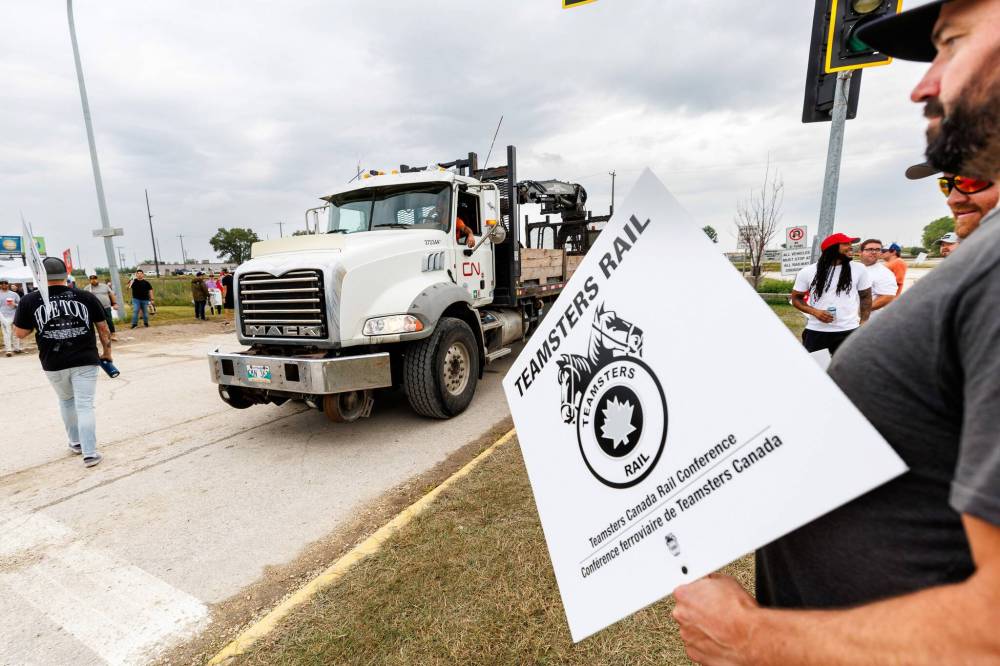Manitoba feels railway lockout pressure
Advertisement
Read this article for free:
or
Already have an account? Log in here »
To continue reading, please subscribe:
Monthly Digital Subscription
$0 for the first 4 weeks*
- Enjoy unlimited reading on winnipegfreepress.com
- Read the E-Edition, our digital replica newspaper
- Access News Break, our award-winning app
- Play interactive puzzles
*No charge for 4 weeks then price increases to the regular rate of $19.00 plus GST every four weeks. Offer available to new and qualified returning subscribers only. Cancel any time.
Monthly Digital Subscription
$4.75/week*
- Enjoy unlimited reading on winnipegfreepress.com
- Read the E-Edition, our digital replica newspaper
- Access News Break, our award-winning app
- Play interactive puzzles
*Billed as $19 plus GST every four weeks. Cancel any time.
To continue reading, please subscribe:
Add Free Press access to your Brandon Sun subscription for only an additional
$1 for the first 4 weeks*
*Your next subscription payment will increase by $1.00 and you will be charged $16.99 plus GST for four weeks. After four weeks, your payment will increase to $23.99 plus GST every four weeks.
Read unlimited articles for free today:
or
Already have an account? Log in here »
Hey there, time traveller!
This article was published 22/08/2024 (456 days ago), so information in it may no longer be current.
Fears of a massive disruption to economic activity in Manitoba abated Thursday evening in the wake of the federal government seeking binding arbitration to end the railway labour dispute that had brought trains — and their cargo — to a halt nationwide.
At 12:01 a.m. EDT, the Canadian National Railway Co. and Canadian Pacific Kansas City Ltd. locked out some 9,600 unionized workers across Canada, leaving the province’s farmers and grain handlers facing a grim scenario. CPKC workers began a strike at the same time.
“The cascading effect is $50 million per day in lost sales that doesn’t get made up (because there is already grain lined up to ship whenever the trains get rolling again) and therefore lost down the road,” said Wade Sobkowich, executive director of Western Grain Elevator Association.

MIKE DEAL / FREE PRESS
Members of the Teamsters Canada Rail Conference union on the picket line at the CP Winnipeg Yard, Keewatin Street entrance, Thursday morning.
Chuck Fossay, a grain farmer near Starbuck, southwest of Winnipeg, said he was lucky to be able to deliver 20,000 bushels in the three days before the lockout, including some Wednesday afternoon. “We were very fortunate,” he said.
The sentiment was not lost on the picket line Thursday morning outside the CPKC rail yard on Keewatin Street in Winnipeg.
“For the most part, we are just trying to keep what we have,” said Virgil Siedler, a CPKC conductor and locomotive engineer. “It seems like both railways are more interested in getting us legislated back to work than negotiating a collective agreement.
“The detrimental effect on the Canadian economy is not lost on us,” said Siedler. “But if we don’t do this, then other companies are going to know that they can do the same thing to their workers.”
Across the city, outside CN’s Symington Yard in Transcona, Matt Ivall, a CN engineer for 17 years, called the lockout malicious.
“We’re just looking for a status quo agreement. The consensus here is that people are happy with how things are,” Ivall said. “No one is willing to budge on this.”
In an email statement Thursday to the Free Press, Manitoba Premier Wab Kinew said it was “irresponsible” for the companies to lockout their workers. “These industries are vital to Manitoba’s economy and this lockout will negatively impact these sectors at an important time of the year.”

MIKE DEAL / FREE PRESS
Train conductors and engineers took to picket lines Thursday across Winnipeg on the first day of the largest railway lockout in Canadian history. CN and CPKC shut down Canada’s freight rail network after contract negotiations with the Teamsters Union broke down.
Earlier, Terry Shaw, Prairie regional vice-president of Canadian Manufacturers & Exporters, said the rail shutdown was poised to “have a massive impact on everyone.”
A recent survey of CME members found, on average, any total cessation of national rail service would cost each manufacturing company $275,000 per day.
“The negative impact and the severity of the impact of a shutdown cannot be understated, not just to the manufacturing industry, but to the economy at large,” Shaw said.
martin.cash@freepress.mb.ca
matthew.frank@freepress.mb.ca



